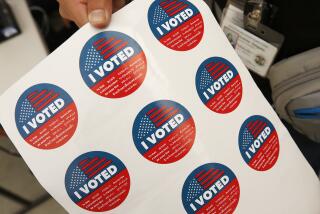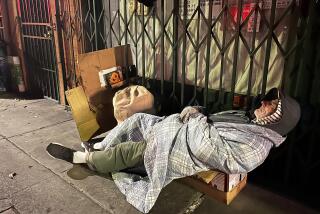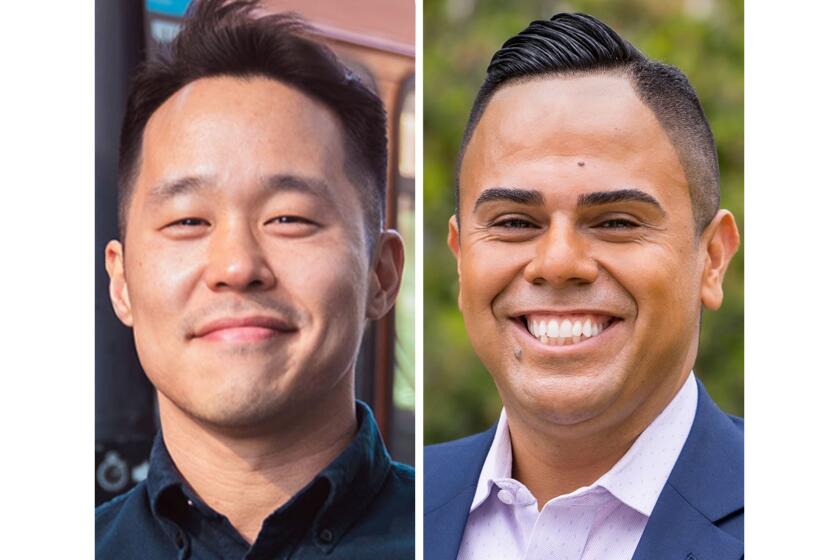Compton plans ballot measure on switching to voting by district
Responding to long-standing complaints that Latinos are grossly underrepresented in local government, the city of Compton has agreed to settle a voting rights lawsuit with a plan that could change how officials are elected.
The suit was aimed at making it easier for Latinos, who now account for nearly two-thirds of the city’s 96,000 residents, to gain greater clout at City Hall, where all council members and most of the top city leaders are black.
This imbalance has been the subject of much debate over the years as Compton’s Latino population has grown and its black population has declined, part of a larger trend that has been reducing African American political clout across L.A. County.
Three Latinas filed a suit in 2010 in which they claimed that the city’s current at-large election system violated Latino residents’ rights by diluting their voting power. Although Latinos are a majority of the city’s population, they are a minority of eligible voters. Less than 30% of Compton’s approximately 62,000 Latino residents are citizens old enough to vote.
The suit sought to force a change to voting by district for the four council seats, which would allow for the creation of a Latino-majority district.
Under the settlement announced at Tuesday night’s council meeting, the city agreed to put a measure on the June ballot that would institute by-district voting. If the measure fails in June, it will go to voters again in November.
City Atty. Craig Cornwell said the city hopes that by-district voting will encourage more residents to go to the polls in a city that has been plagued by low turnout. Frequently, less than 10% of registered voters cast ballots in the municipal elections.
Low turnout has been an issue in cities across southeast L.A. County, which have large immigrant populations that either cannot or do not vote.
“The common goal of wanting to increase voter turnout has led to this settlement,” Cornwell said. “It is rare that the city can turn a litigated case over to the citizens for a determination on how the city will move forward, and this is such a case.”
Many local government agencies, including the Compton Community College District and the cities of Modesto and Tulare, have faced similar lawsuits since the California Voting Rights Act was signed into law in 2002.
Michael Colantuono, an attorney who specializes in municipal law, said the act makes it very difficult for cities with significant minority populations to defend at-large elections. The law requires by-district elections if there is any evidence of “race-based” voting, and if it can be shown that a minority district can be drawn.
“If you have a substantial number of underrepresented minorities, you can’t win,” Colantuono said.
Jesse Choper, a professor of law at UC Berkeley, said a shift to district voting could make a difference in Compton.
“It’s a pretty simply math problem,” he said. When a city has racially polarized voting and a minority group of voters, he said, “you get nothing in a citywide single district election.”
Reaction in Compton on Wednesday was mixed.
Royce Esters, 74, is an African American businessman and has been a Compton resident since 1956, when the city was predominantly white and there were no blacks at City Hall. He said changing the voting regulations wasn’t the solution to getting better Latino representation on the City Council.
Whether local elections are held district-by-district or at-large, going to the polls is what counts, Esters said.
He expressed the view of many Compton residents, that African Americans shouldn’t have to compromise their hold on political power, which they long waited to capture from whites. Latinos should follow the example of African Americans, he said.
“We waited our turn,” Esters said. “All they’ve got to do is campaign real hard and win.”
Diana Sanchez, who ran for City Council in April 2009 and said she plans to run again in 2013, praised the city’s decision to put the charter amendment issue to a vote.
“It’s a step in the right direction,” said Sanchez, 39, who was born and raised in Compton. “It will get voters to go out on election day, because they will see it as something important.”
Other Latinos said they felt the plaintiffs should not have settled for placing a measure on the ballot.
Martin D. Chavez, 52, a third-generation Latino resident of Compton who ran unsuccessfully for council in 1989, said allowing residents to vote on amending the charter would probably maintain the status quo, because the Latino vote would be stymied by the same factors that have prevented Latino candidates from being elected.
“It’s asking the electorate to leave what they have the same way,” he said. “It’s just another way to maintain control without giving up power.”
Gay Grunfeld, an attorney representing the plaintiffs, Felicitas González and Flora Ruiz, said they were pleased with the solution (a third plaintiff is no long part of the suit). If voters approve the measure, Grunfeld said, the new district lines should be drawn in time for the city’s next council election in April 2013.
The plaintiffs have been elusive. When asked to set up an interview with one of them, Grunfeld instead provided a third person, Enelida Alvarez, 30, who said she had been planning to join in the suit before it settled. Alvarez said she was pleased about the settlement’s potential to increase voter turnout.
Grunfeld would not allow her to answer questions about how she became involved in the case or how she and other Latinos in the community felt about their political representation.
More to Read
Sign up for Essential California
The most important California stories and recommendations in your inbox every morning.
You may occasionally receive promotional content from the Los Angeles Times.












